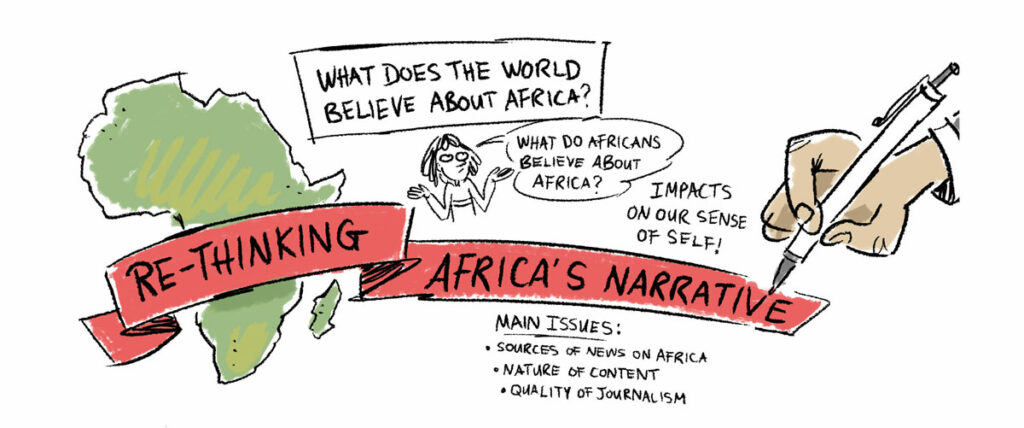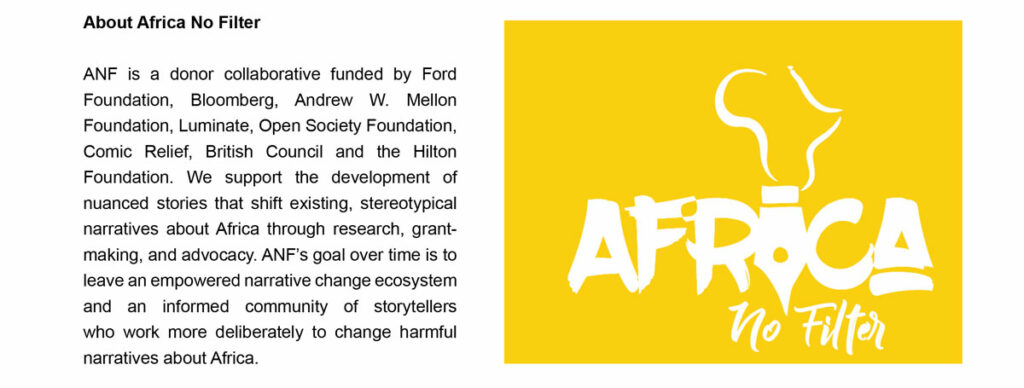By Jamaine Krige
The stories we are told and the stories we tell each other about Africa have the power to shape what we think and influence how we act. This, according to Executive Director of Africa No Filter (ANF) Moky Makura, addressing graduates at the fraycollege Into the Future conference. She says shifting the narrative about Africa is important, because what the world believes about the continent is also what the continent believes about itself.

Africa No Filter is a donor collaborative and grant-making organisation that aims to support the development of nuanced and contemporary stories, shifting stereotypical and harmful narratives within and about Africa. Africa No Filter is a donor collaborative and grant-making organisation that aims to support the development of nuanced and contemporary stories, shifting stereotypical and harmful narratives within and about Africa.
Before the current narratives can be shifted, however, they must first be understood. This is what ANF, in partnership with fraycollege, set out to do in their ‘How African Media Covers Africa’ report, released in 2021. Media is a critical and influential touch point in setting the agenda and perpetuating narratives – both harmful and developmental.
Moky says the findings of the research are concerning, but can also guide African journalists to do better.
Three strong narratives were present in all the storytelling that the West sees about the continent; that Africa is broken, that Africa is dependent on others to help it, and that Africans lack agency and are unable or uninterested in fixing the ‘broken’ continent that they live on.
ANF set out to explore where this narrative comes from. “We found that yes, Western voices are an important source of these narratives, but we also decided to look at how African media cover Africa, because most people on the continent are reading literature, books, newspapers, social media and media – within their country,” Moky explains. “We really wanted to see storytelling and what stories about our continent we were being exposed to.”
THE SURVEY

The survey included 38 editors in 15 countries and analyse 309 articles from 60 outlets cross a three-week period in September and October. there were 25 editors of African Media editors of pan-African outlets and international Correspondents covering Africa.
FINDINGS

• 63 percent of news outlets don’t have outlets in Africa
• News services and free content are a critical source of information
• AFP, BBC and Reuters account for a quarter of all stories on Africa
• Content from African news agencies were minimal
• Many of the stories were verbatim including press releases
• Stories that Africans hear about each other are largely dictated by non-Africans
NATURE OF CONTENT
- 81 percent was hard news and largely political in nature81 percent was hard news and largely political in nature.
- Only 7 percent was human interest and 4 percent on arts and culture.
- 26 percent was politics and elections.
Economics, trade and business made 13 percent, half of those stories were pan African featuring largely expert voices like the African union and World Bank. Not local voices and not voices of people on the ground.
South Africa and Egypt have the most diverse coverage. Stories that we did not see were stories on tourism creativity innovation and tech from other countries.
The trends we picked up in the stories were that they lacked context and there is not enough to understand the story, the roots or the events – the how and the why. The voices of ordinary citizens were rarely featured and there are very few voices of protesters. Few stories that offered a counter-narrative about African countries and there were only a few human interest, arts, culture and celebrity stories. The conclusion is poor journalism. There is little context, no real effort to find news stories and there is a lost opportunity to define the African narrative.
The overall key insights were that stories that Africans are hearing about each other are largely news events and dictated by non-Africans. Most of the stories offer the usual frame and narrative and there are few stories that offer counter-narratives. Most content is of a poor journalistic quality and there is little context, no effort to find different stories or quote voices of African people. The following three reasons are cited:
- the lack of funding which is a similar trend that we see across the world and
- the lack of advertiser interest (content is driven by what advertisers want) in Africa
- the lack of publishing space because print is still big in Africa
Africans learn about themselves and other Africans through the media. The news media is a big part of this. While there are constraints in African newsrooms, there is also much scope for growth in the diversity of news coverage. Based on the survey and interviews with media practitioners, there was an acknowledgement that stereotypical coverage and negative frames can appear even in publications that are supposedly of good quality.
Throughout all the different parts of the study, there is evidence that there is scope for more, better stories about other African countries and the discussions among media practitioners may mark a step towards greater consciousness about this lack.
RECOMMENDATIONS
1. Good journalism for Africa about African countries requires commitment, such commitment needs to rest in an awareness of shortcomings and the possibility of different coverage. While many editors may have acknowledged stereotypes in the content they published, others did not. Even where this was acknowledged, this did not impact practices. This may be partly because of resource constraints and the availability of other content, but there is also a sense that considerations of stereotypical content are not always top of mind when selecting stories and story angles. Without awareness that there is a possibility of nuanced, diverse content and commitment to improve coverage, nothing will change.
2. Secondly, good journalism requires investment. There is a need for resources for African journalism and African stories in order for the content to be available. Such content would include more diverse topics and stories as well as the voices of more people, not only the authorities. Should stories be made available they need to be easy to access.
3. Finally, there is a need for greater collaboration between media practitioners and editors in different countries. By developing networks, making content available and pooling it, the greatest return on investment in good, diverse African stories can be realised.
To download the full report click here

